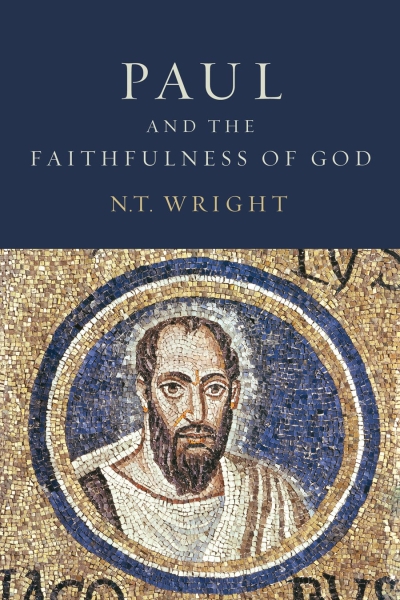In some down-time from PhD coursework I am reading N. T. Wright's long awaited Paul and the Faithfulness of God (PFG). I came across this striking claim,
One of the extraordinary achievements of Paul was to turn 'theology' into a different kind of thing from what it had been before in the world either of the Jews or of the pagans. One of the central arguments of the present book is that this was the direct result of a corollary of what had happened to Paul's worldview. Paul effectively invented 'Christian Theology' to meet a previously unknown need, to do a job which had not, until then, been necessary. (p 26, italics original)
This statement is in the larger context of Wright's argument that the study of Paul, or any ancient person, must be holistic. That is, one cannot simply explain Paul’s “theology” as a systematic collection of ideas as though Paul were simply a brain walking around on two legs (p. 28). This is a throwback to his argument in The New Testament and the People of God Part II (especially chapters 2–4) and makes an important point. When Wright speaks of “worldview” he clarifies that he wants to include social scientific studies while avoiding reducing Paul to a mere product of his culture, social imaginary, etc. In this way he posits a threefold hermeneutical spiral for Paul that includes worldview, theology and history (p. 23–24). Each is element is necessary for a “thick description” of Paul and no element can be avoided without reductionism.
In PFG, however, Wright goes further to make a specific claim about Paul’s role in creating Christian theology. It’s not entirely clear to me what exactly Wright means by “Christian theology” here, and his explanation of this claim is terse. However, I think that as Wright sees it, when Paul was confronted with fundamental “why” questions,“he had to speak of one particular God, and of the world, in a way nobody had before” (p. 27). Wright sees Paul doing something radically new with theology both in its content and its function within his larger worldview.
As Wright sees it, Paul’s theology is part of a new worldview, a revision of Jewish theology so radical in content that it came to a serve a new function in his worldview. Using the example of Philemon, Wright describes Paul’s unique worldview as it relates to “reconciliation”,
There is no sign that he is appealing to, or making use of, the symbols and praxis of his Jewish native world. Nor is he appealing to an implied world of social convention [. . .]. Nor is he drawing on any previously elaborated philosophical [. . . ] schemes of thought. He has stepped out of the Jewish boat, but not onto any hidden stepping-stones offered from within the non-Jewish world. He appears to be walking on the water of a whole new worldview. (p. 30)Based on what Wright does here, it appears to me that Wright is saying Paul's invention of Christian Theology is a result of new theological content about God based on his experience of the risen Christ which raises theology to a new more central activity for those who claim to follow the risen Christ.
What do you think? Did Paul "invent" Christian theology? And if so, in what sense?

